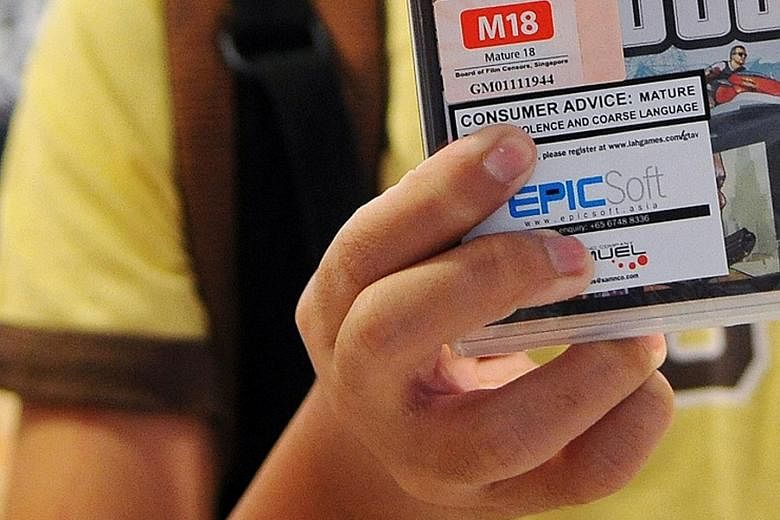Retailers who repeatedly sell physical copies of age-restricted video games to underage buyers will be barred from selling such games, under a new law passed by Parliament yesterday.
The duration of the ban will be decided on a case-by-case basis.
This move comes under an automatic class licence scheme to protect the young from inappropriate content as video games become more complex and graphic, said Minister for Communications and Information Yaacob Ibrahim.
The scheme is among a slew of changes made to the Films Act which received the nod from Parliament, following assurances from Dr Yaacob to MPs that the changes are necessary to keep up with technological and societal developments.
Other major changes include an optional but new co-classification scheme, which allows trained employees of some video companies to become film content assessors and classify films up to a PG13 rating, so that titles will be available to viewers at an earlier date.
The IMDA will also be given new powers to reclassify films to a higher or lower rating.
Dr Yaacob said this is needed as film classification guidelines are "updated from time to time to reflect our evolving norms and values". Hence, a film with an old classification may qualify for a higher or lower rating today.
Dr Yaacob also said, in response to Mr Zaqy Mohamad (Chua Chu Kang GRC), that there are safeguards against lobbying by interest groups to reclassify controversial films.
Reclassification will be done only after "careful consideration" and the views of the Films Consultative Panel will be sought for contentious films, he added. The panel comprises a cross-section of Singaporeans.
Last December, the film community had expressed concerns about the "sweeping and invasive powers" in initial proposals to amend the Act in a move to shift enforcement and investigation of all offences under the Films Act from the police to the IMDA.
Following a public consultation, the expanded powers for IMDA officers to enter and search premises without warrant were confined to serious offences, namely, those involving prohibited films and the unlicensed public exhibition of films.
Currently, they can do so only for obscene, party political and unclassified films.
Other new powers of these officers include being able to ask for information and documents needed for investigation, gain access to places where films are publicly exhibited or distributed, and take statements from people as part of an investigation.
These measures will help to close gaps in the enforcement regime, said Dr Yaacob.
All six MPs who spoke in the debate asked about checks and balances to ensure the new powers are used judiciously.
Dr Yaacob said IMDA enforcement officers are trained by the Home Affairs Ministry's Home Team Academy, and most of them have prior experience in law enforcement agencies.
Owners can also challenge in court the seizures of their items without a warrant, he added.
There will also be changes to the appeals process for films refused classification owing to national security concerns.
Instead of the Films Appeal Committee (FAC), the Minister for Communications and Information will decide on the appeals, after consulting the committee.
To this, Nominated MP Kok Heng Leun asked for a clearer definition of what constitutes a film that goes against national security.
Dr Yaacob said such a film may have content "detrimental to the continued existence of the country, its ability to exercise its sovereign rights, and the safety and security of its citizens and their way of life".
But given the complex nature of such security matters, it would be "prudent" to avoid binding its definition in legislation, he added.
There were concerns that the change would undermine public confidence in the appeal process.
Dr Yaacob replied: "It is neither ideal nor fair for a citizen panel like the FAC to assess threats to national security, as members may not be privy to the full extent of security concerns due to the sensitivity of the information."
He added the amendment "also takes into account the increasing pervasiveness of media and how different media, including film, can be used to disseminate content that could undermine our security".



